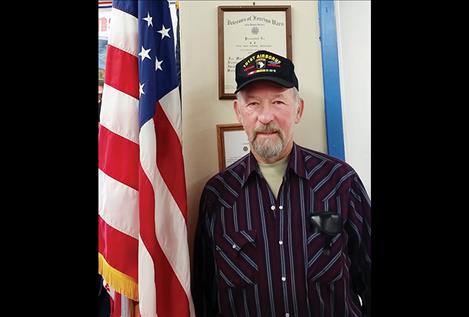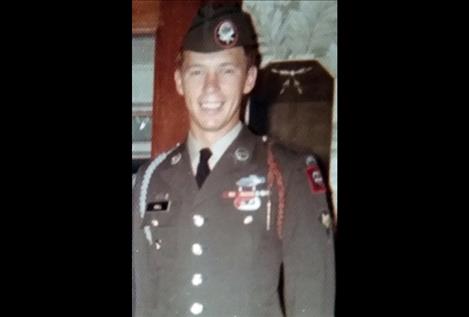Veteran Spotlight
Dan Hall August 16, 1945 Vietnam Sergeant E5 U.S. Army 101st Airborne
Hey savvy news reader! Thanks for choosing local.
You are now reading
1 of 3 free articles.
Dan was attending the University of Minnesota in 1965, but he dropped out for one quarter and immediately got a draft notice. He decided to enlist ahead of the draft. He could enlist for two years but then be obligated for four summers of duty, or enlist for three years. Dan took the three-year option, but it turned out the extra year was for nothing because later there were so many returning from Vietnam that they weren’t required to put in the summer duty after all.
Basic training didn’t get off to a good start at Fort Leonardwood, Missouri because weather was bad and Dan got sick with a sinus infection – the hospitals were full of it. This was supposed to be eight weeks of training, but Dan had to wait for the rest of his group to arrive so he spent an extra week or two working around the post.
Dan was assigned to Fort Polk, Louisiana where the weather continued to be against him. It rained every day. There was no heat in the barracks and the windows were nailed open to prevent sickness from stale air. And, there were roaches everywhere. Dan put in his nine weeks of AIT (Advanced Individual Training) learning machine guns, rifles, grenades, how to perform recon (reconnaissance) at night, etc. He built hootches (Vietnamese houses) that had false walls and spring-loaded spears to become familiar with what he might come up against.
Fort Benning, Georgia was Dan’s next school – three weeks of paratrooper training and jump school. He actually requested this training, wanting to see if he had guts enough to jump out of a plane. He did! From there he went to Fort Bragg, North Carolina for Special Forces training. Dan completed basic training there but left before graduation to join the 101st Airborne. He never got to wear the green beret, but he did wear the paratrooper red beret.
After 11 months in the states, Dan was sent to Vietnam as a “replacement.” His time was “search and destroy” on the ground – he never did get to jump. Vietnam was hard duty. He walked every day from sun up to sun down, crossing rivers all the time with a 120-pound pack. Dan weighed only about 130 pounds. It took a month to acclimatize and he remembers sweating like crazy. He lived on two C-Rations per day and river water, and got sick. There were pills for that but he was weak and still had to keep walking. He learned to speed up when being shot at.
This war was different because men didn’t always follow orders given by inexperienced or inept officers. Dan was once in a group in the field that was voting on whether to eliminate an officer whose decisions were a constant danger to the men. Dan said because of his conscience he couldn’t vote for it and a single veto saved the guy.
Dan was in charge of a “fire team,” a half squad of about five people, depending on the number of wounded or killed. Dan is grateful that no one he was ever in charge of was lost. It was hard to know who the enemy was. The Vietnamese people were so poor that they would fight for whoever paid the most, in money or marijuana to smoke. When they came into a village in the “hot zone,” they decided whether to fire on it depending on the actions of the people. If there was no trouble, the troop would go on through. One of his friends was killed by a village woman – you never knew for sure who to trust.
The troop would be out in remote roadless jungle for more than a month at a time. Then they’d be helicoptered back to camp for three days – time to have memorial services for those who were killed, get shots if they needed them, go to the beach so salt water could wash away jungle rot, and clean their rifles. They slept on the ground with no tents.
One time the enemy mowed down an area covered with brush but Dan and his men were sill alive stretched out behind their rucksacks. Another time the troop was running out of food. A friend (who actually should have been the guy in charge) made everyone, including the officer, put what little food they had left in a helmet and cooked it. Everybody got a spoonful and then passed the helmet to the next guy.
On Dan’s last patrol his platoon was ordered to go through a minefield instead of around it. His buddy stepped on a mine. The buddy lost a leg, and the guy next to him and Dan were both critically wounded. He spent the next four months and 10 days in hospitals, 14 days at Chu Lai in a hospital MASH unit (Mobile Army Surgical Hospital.) It was here that doctors did an experimental transplant of an artery from one leg to the other and saved the leg from being amputated. He was nine days in another MASH unit in Da Nang, 29 days in a hospital in Japan, overnight in the Philippines and again in Fort Scott, Kansas, and finally was attached to Fort Riley, Kansas for two months. This was the closest hospital to home that had room for him. He received his Combat Infantry Badge once back in the states. Dan learned to re-walk and has conditioned his mind so he only limps now if very tired or stressed.
After he was released and after a Christmas break, Dan went to the 82nd Airborne back at Fort Bragg for nine months in ground-to-air helicopter communications. It was still a hot and humid climate. Dan’s service finally ended on Sept. 28, 1968 when he turned in his equipment and was transported back to Minneapolis, Minnesota.
Things were not good when Dan got back home. The people were ok but it took a while for him be ready to get a job and move on. He happened to work with a Vietnamese trainee who was getting a year’s free wages. It bothered him - not that the guy was Vietnamese - but that he got a free ride while Dan, a veteran, had to work for his pay.
Dan would like to find a group of his buddies but hasn’t been able to. He once signed up for a convention in North Carolina but cancelled when he didn’t find anyone on the list that he knew.
Dan would advise everybody after age 18 to be in the military. He agrees with having women serve but not in the same units and not in combat – he says people have no idea what would be done to women if they were captured.
Thank you for your service, Dan.

















